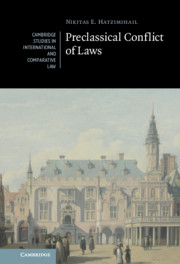Book contents
- Preclassical Conflict of Laws
- Cambridge Studies in International and Comparative Law: 153
- Preclassical Conflict of Laws
- Copyright page
- Dedication
- Epigraph
- Contents
- Figures, Tables and Maps
- Maps
- Acknowledgments
- 1 Introduction
- Part I History and Historiography in the Conflict of Laws
- Part II Current Concerns
- Part III Bartolus da Sassoferrato and the Conflict of Laws in the Middle Ages
- Part IV Ulrik Huber and Conflict of Laws in the Early Modern Period
- 11 “Saepe fit, ut negotia”: Huber on the Conflict of Laws
- 12 The Political Context of Huber’s Conflict of Laws
- 13 Doctrinal Aspects of Huber’s Conflict of Laws
- 14 Huber’s Conflict of Laws in the Conceptual Battlefield
- Part V Epilogue
- Bibliography
- Index
- Cambridge Studies in International and Comparative Law
13 - Doctrinal Aspects of Huber’s Conflict of Laws
from Part IV - Ulrik Huber and Conflict of Laws in the Early Modern Period
Published online by Cambridge University Press: 08 July 2021
- Preclassical Conflict of Laws
- Cambridge Studies in International and Comparative Law: 153
- Preclassical Conflict of Laws
- Copyright page
- Dedication
- Epigraph
- Contents
- Figures, Tables and Maps
- Maps
- Acknowledgments
- 1 Introduction
- Part I History and Historiography in the Conflict of Laws
- Part II Current Concerns
- Part III Bartolus da Sassoferrato and the Conflict of Laws in the Middle Ages
- Part IV Ulrik Huber and Conflict of Laws in the Early Modern Period
- 11 “Saepe fit, ut negotia”: Huber on the Conflict of Laws
- 12 The Political Context of Huber’s Conflict of Laws
- 13 Doctrinal Aspects of Huber’s Conflict of Laws
- 14 Huber’s Conflict of Laws in the Conceptual Battlefield
- Part V Epilogue
- Bibliography
- Index
- Cambridge Studies in International and Comparative Law
Summary
Huber’s treatment of conflict issues forms, in both its versions, part of comprehensive – and systematic – doctrinal works. It must therefore be placed in that context.of this chapter examines the legal style of Huber’s conflicts treatment: the choices he made as to structure and the organization of his argument, on the one hand, and as to the use of authorities, on the other.addresses the organization of the legal subject matter within our text.examines the use of the form/substance distinction, and their corollaries. , , andaddress respectively the role of jurisdiction, party autonomy, and decisional harmony in Huber’s choice-of-law system.
- Type
- Chapter
- Information
- Preclassical Conflict of Laws , pp. 422 - 462Publisher: Cambridge University PressPrint publication year: 2021

